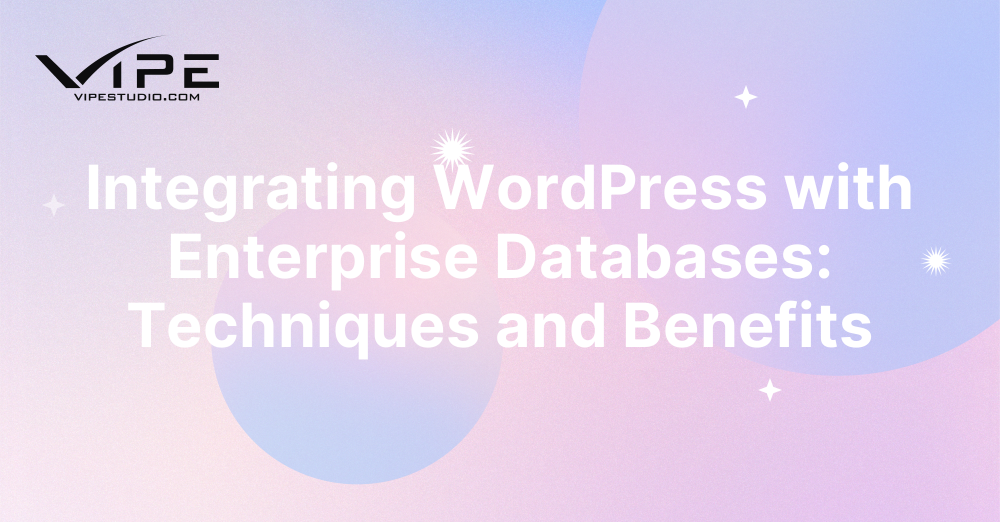20.11.2024
WordPress Development
Integrating WordPress with Enterprise Databases: Techniques and Benefits
READING TIME: MIN
Table of Content
Integrating WordPress with Enterprise Databases: Techniques and Benefits
Integrating WordPress with enterprise databases can greatly enhance data management capabilities and streamline operations for organizations. This integration allows businesses to harness the power of their existing databases while leveraging WordPress as a versatile content management system. Here are five key techniques for integrating WordPress with enterprise databases and the associated benefits.
Create Custom Database Tables
One effective method for integration is the creation of custom database tables within WordPress. While the platform has built-in database structures, enterprises often require unique solutions to handle specific data needs. By designing custom tables, organizations can optimize their data structure to meet particular business requirements. This approach allows for enhanced performance, as isolating specific data reduces the load on WordPress’s default tables and speeds up data retrieval. Additionally, custom tables help ensure data integrity, as they can be tailored to minimize redundancy and maintain consistency.
Leverage REST APIs for Seamless Integration
Using REST APIs is another powerful technique for connecting WordPress with enterprise databases. WordPress includes a built-in REST API that enables external systems to communicate effectively with the WordPress environment. This allows organizations to achieve real-time data access, ensuring that users have up-to-date information at their fingertips. A decoupled or headless architecture can also be implemented, where WordPress serves solely as a content management system while other front-end applications utilize different technologies. Moreover, REST APIs facilitate interoperability with various software systems, such as Customer Relationship Management (CRM) or Enterprise Resource Planning (ERP) systems, creating a cohesive data ecosystem.
Utilize Powerful WordPress Plugins
Numerous WordPress plugins can simplify the integration process with enterprise databases, providing enhanced functionality without extensive coding knowledge. For instance, the WP Data Access plugin allows users to manage and manipulate database tables directly from the WordPress dashboard, making database interactions user-friendly. The WP All Import plugin streamlines the process of importing large datasets from CSV or XML files, allowing organizations to populate their WordPress sites with external data seamlessly. Additionally, Advanced Custom Fields (ACF) enables users to create custom fields for various post types, which helps integrate additional data types into WordPress effortlessly.
Implement Middleware Solutions
For enterprises that face more complex integration challenges, employing middleware solutions can effectively facilitate communication between WordPress and enterprise databases. Middleware acts as a bridge, translating and transferring data between different systems. This approach ensures data synchronization across multiple platforms, which reduces discrepancies and enhances accuracy. Middleware also provides scalability, efficiently managing increased data volumes and user requests, making it suitable for growing organizations. Furthermore, it allows for centralized management, enabling businesses to oversee various data sources from a single point, simplifying governance and compliance efforts.
Prioritize Security and Compliance
Security is paramount when integrating WordPress with enterprise databases. Organizations must implement various strategies to protect sensitive data. One effective approach is role-based access control, which restricts access to sensitive information, ensuring that only authorized personnel can view or modify critical data. Additionally, encrypting data both in transit and at rest helps safeguard against unauthorized access and potential breaches. Regular security audits and vulnerability assessments are also essential to identify risks and ensure that security measures are robust and effective. By prioritizing security and compliance, enterprises can protect their data assets and maintain trust with stakeholders.
Customized WordPress Development for Enterprises Looking to Stand Out
If your enterprise wants to stand out, our Enterprise WordPress Agency for Custom Development is your go-to partner. We specialize in creating custom WordPress solutions designed to highlight your business’s unique strengths. Our Enterprise WordPress Agency for Custom Development ensures that every aspect of your website is tailored to your brand, from the layout to the user experience. By working with our Enterprise WordPress Agency for Custom Development, you’ll gain a competitive edge in your industry. Let our Enterprise WordPress Agency for Custom Development bring your vision to life.
Conclusion
Integrating WordPress with enterprise databases offers numerous advantages, including improved data management and enhanced operational efficiency. By creating custom database tables, leveraging REST APIs, utilizing powerful plugins, implementing middleware solutions, and prioritizing security, organizations can build a robust system that meets their growing needs. This integration empowers enterprises to effectively harness their data, drive informed decision-making, and foster growth in a competitive landscape.
More on The Topic
- The Role of AI in WordPress Development Workflows
- Optimizing WordPress for Enterprise: Beyond Basic Caching
- WordPress and Headless Commerce: A Provocative Dilemma
- Decoupled WordPress Architecture: The Future or a Fad?
- Rethinking WordPress Security: Lessons from Real Breaches
The content of this website is copyrighted and protected by Creative Commons 4.0.



